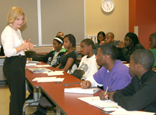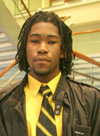|
|

|
Students guided through mentor program
|
by Cindy Abole
Public Relations
In 2006, 11 men came to MUSC’s campus making history as members of the
Class of 2010 and the largest group of black males to enter the College
of Medicine. Six of these men are committed to leaving a legacy that
they hope will continue to guide and prepare minority youth around the
Lowcountry toward careers in medicine and other health care specialties.
The program, “A Gentleman and A Scholar,” was introduced in Fall 2007
by the six students—Andres Ayuso, Vandy Gaffney, Larry Shuler, Hubert
Roland White II, Brandon Williams and Michael Smith, Ph.D. It
eventually gained the attention and support of College of Medicine Dean
Jerry Reves, M.D., and Deborah Deas, M.D., senior associate dean for
strategic diversity initiatives. The program’s intent is to provide
mentoring to high school and college students who show an interest in
medicine and health care professions. It also provides an educational
component that prepares students for college and post-graduate
education, an introduction to professionalism and opportunities to
build a mentor-student relationship. The program came at the same time
the college was seeking to establish a pipeline initiative for minority
recruitment.
“We were thrilled to know that medical students created this program,”
said Deas, who has worked with the dean’s office on diversity
initiatives since 2001. “Originally, they wanted to coordinate this
program on their own, but realized they needed the administrative
support, funding and other expertise from the college in order for the
program to be as successful as it is today. Dr. Reves was fully on
board and supportive of this program from the start. Their focus was to
name the program, ‘A Gentleman and A Scholar,’ which is an excellent
name. Not only are they mentoring these individuals to become academic
achievers but also in the area of professionalism through their social
actions in the community.”
“Within the past year, we’ve gotten to know these students academically
as well as on a personal level,” said Gaffney. “We know the type of
person they are—their strengths and weaknesses—so we can give them
advice and lead them in the right direction with their education and
success.”
Participants were recruited from tri-county public and private high
schools via guidance counselors or science teachers. They are primarily
minority males, ages 14 and older, who are considered in good standing
at school. The program also reached out to interested students at area
colleges including Charleston Southern University, College of
Charleston, The Citadel, Claflin University and South Carolina State
University. Interested students apply to the program and also submit
recommendation letters from their teachers or community leaders. The
challenge, according to Gaffney, has been merging the needs of both
high school and college students into the program curriculum.
During the first year, the program welcomed 17 students and six
mentors. In last fall's induction ceremony, 14 new students were
welcomed including the group’s first female student, Parris Jackson, a
sophomore from Wando High School. Jackson was paired with first-year
medical student Crystal Johnson throughout her experience.
 Dr. Jennie Ariail reviews study information with A Gentlemen and A Scholar participants. Dr. Jennie Ariail reviews study information with A Gentlemen and A Scholar participants.
All participants attend monthly meetings held at MUSC which usually
include an education program with a guest speaker. Students also are
assigned to an MUSC student who serves as a mentor. Previous monthly
meetings have featured guest presentations by Reves; Ian Johnson, M.D.,
a neurosurgeon in the Department in Neurosciences; Thad Bell, M.D.,
associate dean for minority affairs, College of Medicine; and Jennie
Ariail, Ph.D., associate director, Center for Academic Excellence.
During the group’s Jan. 24 meeting, Ariail spoke to first-year
participants and shared information about studying and test-taking
strategies, note taking and time management.
“This student-led program is a great encouragement to all
participants,” said Ariail. “It brings people together from different
types of backgrounds to share our campus’ resources. Most importantly,
it teaches individual interaction and accountability among its
participants and allows these students to imagine the unimaginable and
encourages them to reach out and realize their dreams.”
Another aspect of the program is the priority Gaffney and other
participating leaders give to time needed for mentor-student
interaction. Some mentors manage between two to three students and
communicate weekly with their student about their academic schedules,
extracurricular activities, study issues, etc. This “check-in”
practice, conducted by a mentor or respected adult, is something that
some participating parents have already favored and eagerly support.
“Mentors also talk to their students about other topics including peer
pressure, making choices, the company one keeps and other subjects that
are strictly kept on a professional level,” said Gaffney, who also
mentors two college students.
Additionally, participating medical students are able to log their time
as volunteer hours, which can be helpful as they match for residencies.
As both mentors and students matriculate out of the program, Gaffney,
medical school faculty and others hope that other medical students
will commit to the program. Deas and the dean’s office have
created a database to track participants and hopefully will invite
these students back to MUSC. Reves also would like to see the program
expand to women and growth of like programs in each of MUSC’s other
colleges, plus collaboration on an interprofessional perspective in the
future.
“As faculty, we’re not only preparing our medical students to become
great clinicians, we also want to teach them the responsibility of
giving back to their community. Our hope is that their interest in
giving back continues as they become medical professionals living
within their communities,” Deas said.
Student succeeds through guidance
George
Gross Jr., 18, is a senior at St. John’s High School. An advanced
preparatory honors student from Wadlamaw, Gross will become the first
person in his family to attend college next fall and plans to
study biochemistry at either the College of Charleston or the
University of South Carolina.
 George Gross Jr. George Gross Jr.
Last spring, Gross heard about MUSC’s A Gentleman and A Scholar
Program from his high school’s guidance counselor and applied and was
accepted. He was paired with College of Health Professions student
Garrett Mann, who is in the master’s in health administration program.
A graduate of Morehouse College, Mann was approached by Gaffney and
other program leaders to participate in this mentorship experience.
“I’m glad to volunteer with this program,” Mann said. “I see it
as giving back to the community. Seeing George develop and succeed
inspires me to want to be a better mentor and role model to others.”
Friday, Feb. 20, 2009
|
|
|




